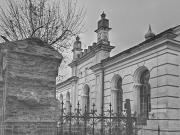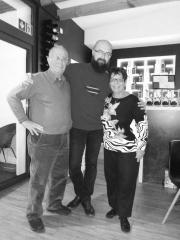FRYDHOF
Every human action is based on motivations that mobilise people to get moving. Several or more people often share these motives. It very often happens that people led by a common incentive meet and form a group, team or coalition. A similar thing transpired in the case of FRYDHOF – Wielkopolska Association for Preserving Memory (Polish: Wielkopolskie Stowarzyszenie na Rzecz Ratowania Pamięci FRYDHOF).
First, before I go on to describe the history of our organisation, it is worth mentioning the purpose that guides FRYDHOF. We profoundly disagree with the passing of time into oblivion. We object to obscuring and devastation of the last traces left by people, entire social groups, who have passed into history. Throughout eastern Wielkopolska, one can observe the results of this contention and inability to understand particular human behaviours that lead to obscuring evidence and negating historical facts. And even some kind of anger towards the act of forgetting. It is there that two groups of enthusiasts became closely acquainted with the historical heritage of the Holländer settlers ("Olędrzy" as their Polish neighbours called them). This heritage is only limited to cemeteries, which are the last traces of people's existence, in many places previously inhabited by those settlers. Since the post-war years, that is from 1945, often to up until now, the Holländer cemeteries, or Evangelical, have been the target of attacks by local people, local authorities, and ordinary hooligans. We do not want to judge the motives of human actions that we do not understand, nor is it up to us to punish them. Therefore, we usually do not wonder why it happened, but rather ask ourselves what we can do and then get to work. For several years, these two groups independently moved around the area of the former Konin Voivodeship, where they explored the Holländer settlements and discovered Evangelical cemeteries. Urszula Karolczak led a group of adepts at the Holländer heritage in Koło and the provinces of Koło and Turek, whilst Damian Kruczkowski did so in the town of Konin and the areas of Konin and Słupca. They were not the formal leaders of these groups, but rather the go-to persons for those who knew they share an interest in the preservation of material traces of the former inhabitants of these lands. People turned to them for help, and often formed ad hoc groups that tidied up and renovated cemeteries. Thus restoring the memory of the Evangelical neighbours and giving the graveyard back to local communities.
These two centres of struggle to preserve memory existed independently of each other, as I have mentioned, for several years. They were trying, more or less successfully, to save as much as possible of the historical heritage of the region of the former Konin Voivodeship. Today, probably no one can remember exactly when these two groups met. However, we certainly worked together throughout 2016, acting as an informal group of "grobers" (a play on Polish "grób" – grave), as we were called somewhat mockingly. We worked entirely voluntarily, and we still do, spending our own money to buy the necessary equipment, fuel and materials. Honestly, we did everything at our own expense, sometimes receiving only a little help from local communities. However, as the saying goes, appetite grows with eating. Nowadays, there are not two groups, but a single larger one that developed gradually which allowed us to expand the scope of our work. Now we could not only clean up but also remove fallen trees and branches, cut bushes and mow the grass. Thanks to the size and strength of our group, it became possible for us to lift the scattered massive stone blocks of the tombstones and to put together the broken ones. More and more, we thought about creating a formal group. That would grant us more credibility and transparency, and allow us to apply for grants and subsidies for our activities. We were unanimous in this matter.
From the very beginning, our group has consisted of various people presenting an almost complete cross-section of Polish society. Even back when there were two groups, we have worked closely with the Holy Spirit parish in Konin of the Evangelical Church of the Augsburg Confession. The parish has currently in its care all Evangelical cemeteries from the area of the former Konin Voivodeship. Pastor Waldemar Wunsz has been involved in our activities from the beginning, contributing significantly and working with us. He is currently a member of the board of our association.
At the end of 2016, we all decided to set up an association to help us with many issues related to applying for funds or obtaining necessary approvals and permits for our subsequent projects. On January 13, 2017, our organisation was entered into the National Court Register, which is the date since when we can formally acknowledge the existence of the FRYDHOF Association. Urszula Karolczak became the president of the Association, Damian Kruczkowski – her deputy, Radosław Grzelak – the secretary, Przemysław Tomczyk – the treasurer, and Waldemar Wunsz – a member of the board. The board has remained unchanged to this day. (...)



